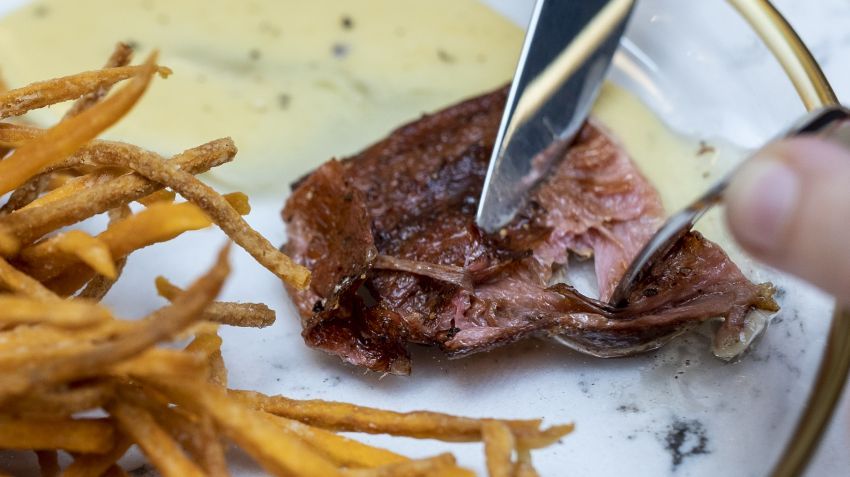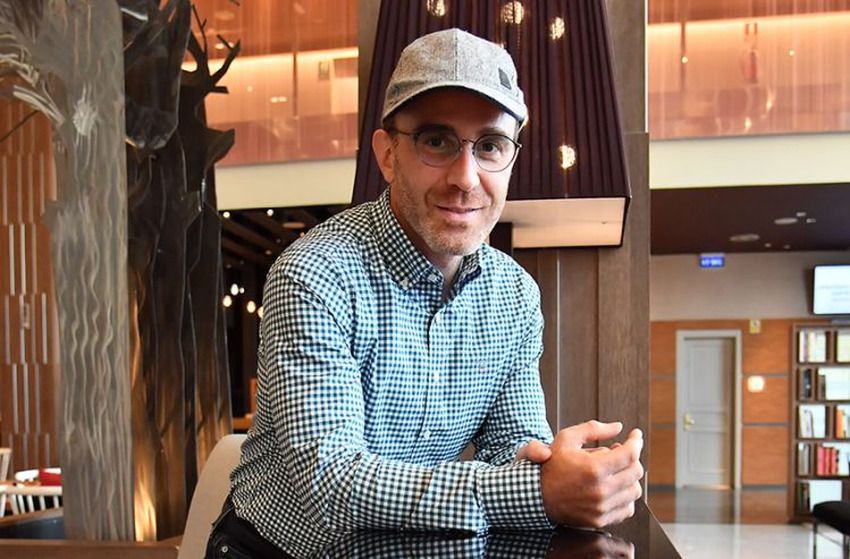- Israeli startup Aleph Farms is taking an “asset-light” approach to scaling up cultivated meat production through a series of manufacturing deals it has struck in Israel and Singapore.
- The startup should now be able to start production in Singapore in 2025, according to CEO Didier Toubia, who has signed a memo of understanding (MOU) with ESCO Aster, the contract manufacturer working with Eat Just to make cultivated chicken in the city-state.
- Aleph Farms has also acquired a facility in Modi’in and related assets from biotech company VBL Therapeutics in Israel, enabling it to produce larger quantities of meat there by late 2024.
- Aleph is scouting for sites in the Northeast region of the US for a larger scale facility and believes it can achieve cost parity with premium beef by 2028, Toubia told AFN.
- In the meantime, it plans a small-scale launch of thin cultivated beef steaks at restaurants in Israel and Singapore later this year using product from its pilot facility in Rehovot, Israel.
Why it matters
Armed with $120 million in funding from backers including L Catterton and DisruptAD, Aleph Farms is one of the best-funded cultivated meat startups, but does not want to burn through all of its cash on capital expenditure, CEO Didier Toubia told AFN.
“Instead of constructing and owning plants and spending a lot of money to build them, we’re working with partners such as ESCO to make the investment and run the plant with us, or what we’ve done in Israel with VBL, looking at ways to build capacity with a more limited initial investment.”
The operation in Singapore “should be sufficient for setting the Singapore market and possibly exporting some of the production into neighboring countries,” said Toubia. The VBL site in Modi’in will manufacture for Israel and other markets in the Middle East.
“We’d describe this as an intermediate phase with mid-scale facilities before going directly to a large-scale facility in the US, but we can get the sites in Israel and Singapore up and running with the money we already have.”
Both Israel and Singapore are motivated by similar concerns around food security, added Toubia. “But these issues apply right across the Middle East and in Asia, where most of the beef is imported because the climate does not fit cattle farming. They also don’t have enough resources in terms of land and water to produce the amount of beef consumed.”
With some studies suggesting cultivated meat has a lower global warming potential, eutrophication potential, water and land use than that of conventional beef (although higher energy use, prompting the need to use renewable energy sources), “Cultivated meat is a great solution for diversifying and strengthening the global food system,” claimed Toubia.
“As part of our contract manufacturing MOU, we will work together with religious authorities on obtaining a halal certificate for our facility, enabling our collaboration with Aleph to expand to even more of the broader region.” Xiangliang (XL) Lin, CEO, ESCO Aster and deputy CEO, ESCO Lifesciences Group
Products and go-to-market strategy
The first products from Aleph Farms will be its signature thin beef steaks, a premium but not a luxury product that the company makes in a two-stage process. It first proliferates cells in a bioreactor, and then transfers them to a tissue bioreactor where multiple cell types are co-cultured around edible scaffolding to create thin strips of tissue containing muscle, fat, and extracellular matrix (collagen and other components).
To create thicker steaks, Aleph Farms has developed a 3D printing platform deploying co-founder Professor Shulamit Levenberg’s breakthrough work in this field. Here, it prints living bovine cells at different stages of differentiation in an edible gel comprising plant protein isolates and alginate into a support bath (a tray containing media). It then incubates the mixture so the cells can continue to differentiate and mature until the steaks solidify as tissue is formed and the tray can be removed. However, this technology will not be deployed in its first wave of products.
Many other startups—under pressure from investors to get a minimum viable product (nuggets, burgers) out in front of consumers—are by contrast harvesting cell biomass (a slurry of cells that have not yet differentiated and matured into tissue) and adding extruded vegetable protein to create a meaty texture, said Toubia.
While this approach is perfectly valid, he said, cells express different proteins when they have differentiated and matured into muscle and fat tissue, which means that a slurry of cell biomass will not have the same taste, texture or nutritional profile as tissue from slaughtered animals.
Thin cut steaks: Price parity in five years from launch?
But is Aleph’s approach economically viable?
Toubia says he’s confident that Aleph Farms can achieve price parity with premium beef by 2028, something he claims will come through a combination of scale and advances in enabling technologies from small molecules to speed cell differentiation and maturation, to reducing the cost of cell culture media, something Aleph is working on with protein production technology supplier Wacker.
Aleph’s agreement with Wacker is non-exclusive, he noted, adding that any recombinant proteins developed through the partnership would be available to any cultivated meat company.
Cultivated meat offers consistent pricing, supply, quality
Asked about the appeal of cell-cultured meat, Toubia has previously-argued that it won’t be successful just because it’s produced more sustainably, and will need to highlight multiple attributes from an antibiotic-free, pathogen-free positioning to animal welfare.
However, other overlooked factors that are appreciated by restaurateurs are consistent quality and pricing, he said. “When you buy a steak, you never really know what it’s going to be like, but as we control the cultivation process, we can deliver predictable supplies and predictable culinary, sensory, and nutritional quality. Our steaks are high in protein, low in saturated fats, and always juicy.”
“We have found some very dangerous strengths of pathogens in conventional meat,” Toubia recently remarked on the New Food Order podcast, in a new episode out today. “The types of pathogens that require an immediate declaration and reporting to the Ministry of Health. Food is a dangerous business, and industrial food is a dangerous business. It’s true for conventional industrial production. It’s probably true for biotech. I do believe that biotech provides a higher level of supervision and control.”

Halal and Kosher certifications
Aleph is working with Jewish and Islamic religious certification bodies to try and secure Kosher and Halal status for its plants and products, said Toubia. “Part of our strategy is making sure that cultivated meat fits into different food cultures and is available to the widest possible population. We’re also working with Hindus and Buddhists.”
‘If you can demonstrate a clear ability to deliver on climate and environment, you’re in a better position to raise money’
When it comes to funding the cultivated meat sector, he said, “As with electric vehicles, where we’ve seen support from different states and tax breaks and regulation, I expect we’ll see more of this in cultivated meat, which can deliver sustainability and resilience.”
Private investors, meanwhile, are looking at “companies with a differentiated approach in terms of products, but also sustainable business models with a path to profitability, and they’re also investing in climate tech,” he said.
“If you can demonstrate a clear ability to deliver on climate and environment, you’re in a better position to raise money, and focusing on beef [which has a bigger environmental footprint than other meats] is key here in terms of impact.”






